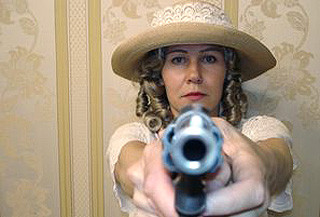Mathilde ter Heijne
16 Sep - 14 Nov 2010
MATHILDE TER HEIJNE
"Any Day Now "
16 Sept.-14 Nov. 2010
The current exhibition at the Kunsthalle Nürnberg shows installations, sculptures, photographs and videos by Dutch artist Mathilde ter Heijne (*1969). Ter Heijne became well-known for her life-sized sculptures; they bear a striking resemblance to the artist, as she used casts of her own face and hands to produce them. These replicas appear as protagonists in her video works or as sound sculptures, enabling the artist to transfer social conflicts to her representatives and yet experience them (almost) personally at the same time.
In many of her works, Mathilde ter Heijne investigates the traditions developed after patriarchal social structures have governed women and their biographies for centuries. The photo series Unknown Woman (2010), for example – also the source of the exhibition motif depicting a young woman in Dutch national costume – shows portraits of women dating from the early days of photography to the 1920s. No information is available concerning the lives of these unknown women, but Mathilde ter Heijne makes them visible once again, moving them away from anonymity and thus posing the question of individual and social identity.
Besides works that visualise aspects of a society shaped by patriarchy, ter Heijne also examines alternative systems: economic systems which function according to the principle of exchange (Give and Take, 2010) or systems of writing based on archaic symbols (Experimental Archeology, 2006/07 or Red, black, silver and white, 2009). The artist shows an alternative social system in the installation Export Matriarchy (2007), which emerged following a trip she took to South East China. To the present day, the Mosuo minority there practise a matriarchal social order, which is reflected in the key meeting place of the family clan, a wooden house called the "Zumu". By reconstructing an original "Zumu" on a smaller scale and in plastic, Mathilde ter Heijne presents a social form shaped by matriarchy.
The survey exhibition Mathilde ter Heijne. Any Day Now, which has been conceived in close cooperation with the artist, presents a diverse selection of works from the past twelve years.
The exhibition will be accompanied by an artist’s book (104 pages, German/English, Verlag für moderne Kunst Nürnberg). In addition to reproductions of the works and extensive source material, the publication comprises interviews with Mathilde ter Heijne and introductory texts to the artist’s themes. The exhibition and artist's book have been produced in cooperation with LENTOS Kunstmuseum Linz. The exhibition – with a distinctive selection of works – will be shown in Linz from 21st January to 27th March 2011.
"Any Day Now "
16 Sept.-14 Nov. 2010
The current exhibition at the Kunsthalle Nürnberg shows installations, sculptures, photographs and videos by Dutch artist Mathilde ter Heijne (*1969). Ter Heijne became well-known for her life-sized sculptures; they bear a striking resemblance to the artist, as she used casts of her own face and hands to produce them. These replicas appear as protagonists in her video works or as sound sculptures, enabling the artist to transfer social conflicts to her representatives and yet experience them (almost) personally at the same time.
In many of her works, Mathilde ter Heijne investigates the traditions developed after patriarchal social structures have governed women and their biographies for centuries. The photo series Unknown Woman (2010), for example – also the source of the exhibition motif depicting a young woman in Dutch national costume – shows portraits of women dating from the early days of photography to the 1920s. No information is available concerning the lives of these unknown women, but Mathilde ter Heijne makes them visible once again, moving them away from anonymity and thus posing the question of individual and social identity.
Besides works that visualise aspects of a society shaped by patriarchy, ter Heijne also examines alternative systems: economic systems which function according to the principle of exchange (Give and Take, 2010) or systems of writing based on archaic symbols (Experimental Archeology, 2006/07 or Red, black, silver and white, 2009). The artist shows an alternative social system in the installation Export Matriarchy (2007), which emerged following a trip she took to South East China. To the present day, the Mosuo minority there practise a matriarchal social order, which is reflected in the key meeting place of the family clan, a wooden house called the "Zumu". By reconstructing an original "Zumu" on a smaller scale and in plastic, Mathilde ter Heijne presents a social form shaped by matriarchy.
The survey exhibition Mathilde ter Heijne. Any Day Now, which has been conceived in close cooperation with the artist, presents a diverse selection of works from the past twelve years.
The exhibition will be accompanied by an artist’s book (104 pages, German/English, Verlag für moderne Kunst Nürnberg). In addition to reproductions of the works and extensive source material, the publication comprises interviews with Mathilde ter Heijne and introductory texts to the artist’s themes. The exhibition and artist's book have been produced in cooperation with LENTOS Kunstmuseum Linz. The exhibition – with a distinctive selection of works – will be shown in Linz from 21st January to 27th March 2011.

